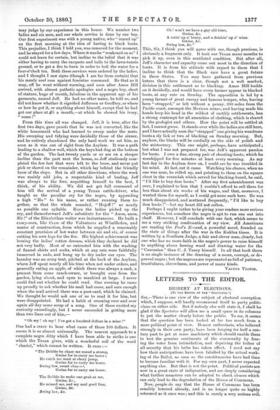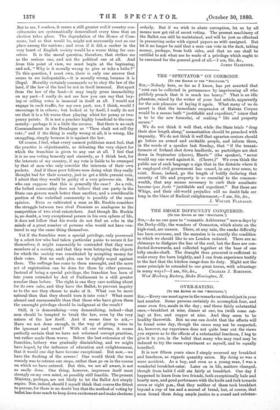LETTERS TO THE EDITOR.
BRIBERY AT ELECTIONS.
cm TIM EDITOR OP TIII EPRCTATOR.1
Sia,—There is one view of the subject of electoral corruption which, I suppose, will hardly recommend itself to party politi- cians on either side. But if nobody else will state it, I shall be glad if the Spectator will allow me a small space in its columns to put the matter clearly before the public. To me, it seems that the question has been looked at far too much from a mere political point of view. Honest enthusiasts, who believed strongly in their own party, have been longing for half a cen- tury past to get at scrim machinery which should enable them to test the genuine sentiments of the community by free- ing the voter from intimidation, and depriving the briber of all security that his bribe has taken effect. I need not say how their anticipations have been falsified by the actual work- ing of the Ballot, as soon as the constituencies have had time to become familiar with it. For my own part, I never expected anything else. But that is not the point. Political purists are now in a great state of indignation, and are deeply considering what further measures can be adopted to check abuses which can only lead to the degradation of the House of Commons.
Now, people do say that the House of Commons has been sensibly lowered already, and is no longer quite so highly esteemed as it once was ; and this is surely a very serious evil.
But to me, I confess, it seems a still greater evil if country con- stituencies are systematically demoralised every time that an election takes place. The degradation of the House of Com- mons, bad as that would be, might not necessarily cost us our place among the nations; and even if it did, a canker in the very heart of English society would be a worse thing for our- selves. It is the moral question, therefore, that strikes me as the serious one, and not the political one at all. And from this point of view, we must begin at the beginning, and ask, "Why is it morally wrong to give or take a bribe ?" To this question, I must own, there is only one answer that seems to me indisputable,—it is morally wrong, because it is illegal. Morality certainly commands us to obey the law of the land, if the law of the land be not in itself immoral. But apart from the law of the land—it may imply gross insensibility on my part—I really do not see how you can say that buy- ing or selling votes is immoral in itself at all. I would not engage in such traffic, for my own part, nor, I think, would I encourage it in others ; but looked at by itself, I really do not see that it is a bit worse than playing whist for penny or two- penny points. It is not a practice highly beneficial to the com- munity—perhaps it is a little the reverse. But there is no such Commandment in the Decalogue as "Thou shalt not sell thy vote ;" and if the thing is really wrong at all, it is wrong, like smuggling, simply because it is against the law.
Of course, I feel, what every earnest politician must feel, that the practice is objectionable, as defeating the very object for which the franchise is given to any one at all. I feel that it is no use voting honestly and sincerely, as I think best, for the interests of my country, if my vote is liable to be swamped by that of men who only consider the interests of their own pockets. And if these poor fellows were doing what they really thought bad for their country, just to get a little present coin, I admit that they would be guilty of a very grievous sin. But who can suppose that this is generally the case ? As a rule, the bribed community does not believe that one party in the State can govern much better than another, and a considerable portion of the unbribed community is possibly of the same opinion. Even so cultivated a man as Mr. Ruskin considers the struggle between two rival Premiers as analogous to the competition of two rival ratcatchers. And though Mr. Ruskin is, no doubt, a very exceptional person in his own sphere of life, it does not follow that his words do not find an echo in the minds of a great number of persons who would not have ven- tured to say the same thing themselves.
Yet if the franchise were a special privilege, only possessed by a select few'who had taken particular pains to secure it for themselves, it might reasonably be contended that they were members of a society, and that they were betraying the objects for which the society was constituted by accepting money for their votes. But no such plea can be rightly urged against them. The suffrage has come to them unsought, and the mere act of registration can be done for them by other persons. Instead of being a special privilege, the franchise has been of late years extended by Act of Parliament to a still greater number than before. The right is one they care nothing about for its own sake, and they have the Ballot, to prevent inquiry as to the use they choose to make of it. What can be more natural than that they should turn it into coin What more absurd and unreasonable than that those who have given them the unsought privilege should be indignant at the result?
Still, it is demoralising—very demoralising, indeed—that men should be tempted to break the law, even by the very nature of the law itself. And it seems time to ask,— Have we not done enough, in the way of giving votes to the ignorant and venal ? With all our reforms, it seems perfectly certain that we have not reformed corrupt practices, but rather made them worse. Before the last extension of the franchise, bribery was gradually diminishing, and we might have hoped, by the influence of education and enlightenment, that it would one day have become exceptional. But now,—we have the flushing of the sewers ! One would think the true remedy was to retrace our steps, rather than go on in the course on which we have entered. But this, we are all aware, is not so easily done. One thing, however, impresses itself most strongly on my own mind, as possibly still feasible. The present Ministry, perhaps, are not likely to let the Ballot Act simply expire. Nor, indeed, should I myself think that course the fittest to pursue, for there is no doubt but that the method of voting by ballot has done much to keep down excitement and make elections orderly. But if we wish to abate corruption, let us by all means now get rid of secret voting. The present machinery of the Ballot can still be maintained, and will be just as effectual in preserving order with signed papers as with unsigned. But let it no longer be said that a man can vote in the dark, taking money, perhaps, from both sides, and that no one shall be entitled to ask what use he made of a privilege which ought to be exercised for the general good of am, Sir, Lk., JAMES GAIRDNER.







































 Previous page
Previous page